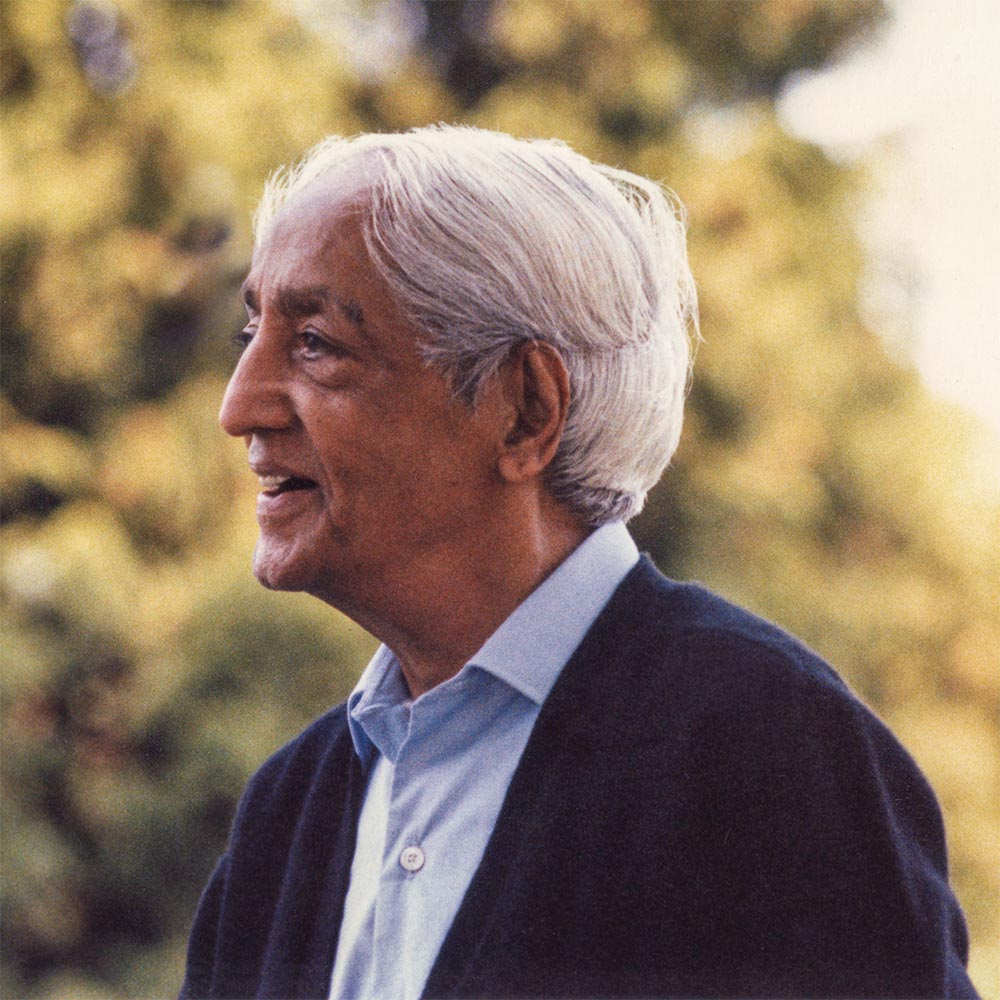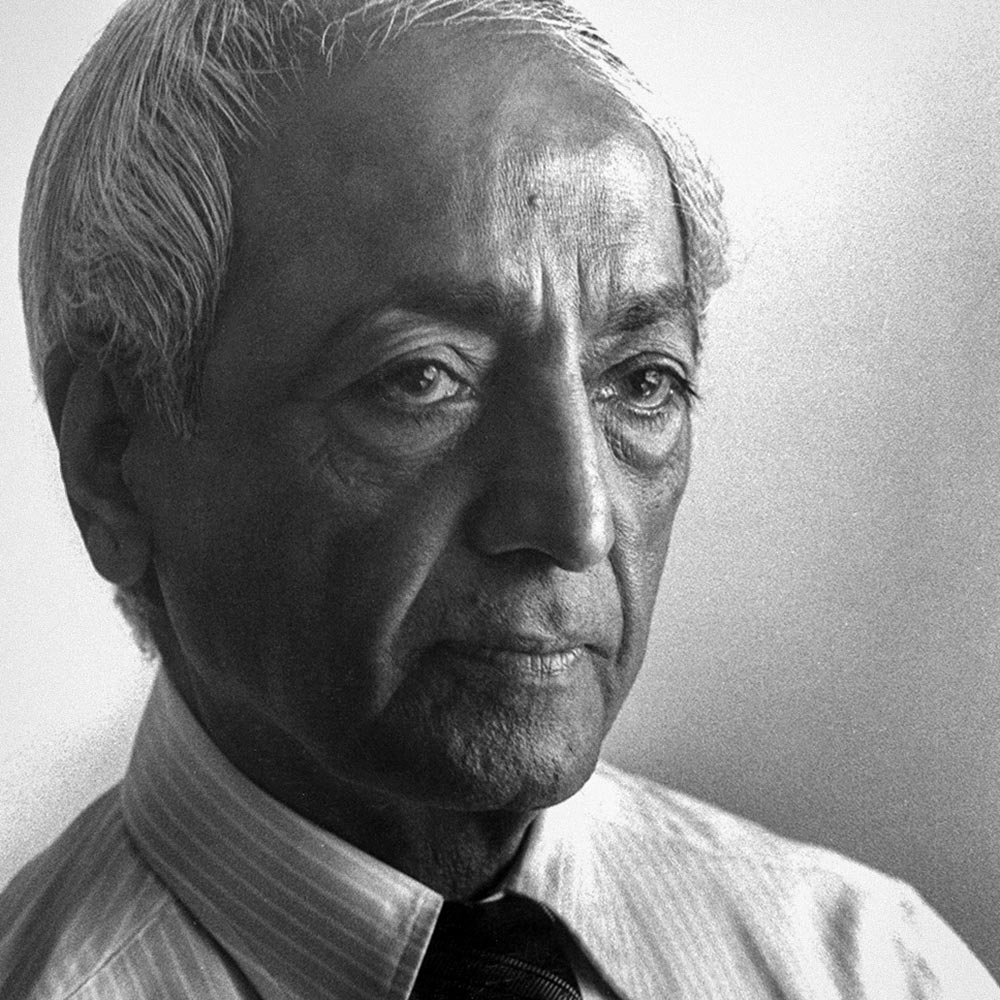Political or religious activity offers a respectable escape from the pettiness and drudgery of everyday life. With a small heart, you can talk of big things.
Krishnamurti, Commentaries on Living 1
Read More
You choose one kind of escape, I another, and my particular brand is assumed to be more worthwhile than yours. But all escape, whether in the form of an ideal, the cinema or the church, is harmful, leading to illusion and mischief.
Krishnamurti, Commentaries on Living 1
Read More
The world is so disruptive, there is so much sorrow and pain, so much war and destruction, that we want to escape and live within the walls of security of our own psychological being.
Krishnamurti, The First and Last Freedom
Read More
You escape through your job, your family, your name, your studies, through painting, etc. Our culture is based on that escape. Our civilisation is founded on it.
Krishnamurti, The First and Last Freedom
Read More
We have developed cunning minds to escape from conflict. Hence we are satisfied with the explanations that scientists and philosophers give us.
Krishnamurti, What Are You Doing With Your Life?
Read More
When life is difficult, when problems are increasing, we escape either through the intellect or through mysticism.
Krishnamurti, Reflections on the Self
Read More
The desire to find God is an escape from life.
Krishnamurti, What Are You Doing With Your Life?
Read More
God becomes another means of escape from the pain and fear of inward poverty. Escapes, however noble, lead to confusion, to sorrow, to stupidity.
Krishnamurti, The World Within
Read More
Escapes harden the self-enclosing walls.
Krishnamurti, The World Within
Read More
Can the mind stop running away, escaping, and not ask how to stop running away? The very inquiry into how the mind is to stop escaping becomes another escape.
Krishnamurti, Reflections on the Self
Read More
I am escaping, and I see how absurd it is. I have to deal with ‘what is’, and to deal with ‘what is’ I need energy. Therefore, I will not escape. Escape is a waste of energy.
Krishnamurti, The Awakening of Intelligence
Read More
If you escape from the battle, you have not understood it. The battle is you. How can you escape from yourself? You can take a drug, you can pretend that you have escaped, you can repeat mantras and do all kinds of things, but the battle is going on.
Krishnamurti, The Awakening of Intelligence
Read More
Escape is very dangerous because, like a drug, it hides the real problem.
Krishnamurti, Meeting Life
Read More
Have no shelter outwardly or inwardly; have a room, or a house, or a family, but don’t let it become a hiding place, an escape from yourself.
Krishnamurti, Meeting Life
Read More
Each moment is a challenge. To meet this challenge inadequately is a crisis in living. We don’t want to see that these are crises, and we shut our eyes to escape from them. So we become blinder, and the crises augment.
Krishnamurti, The Urgency of Change
Read More
These quotes only touch on the many subjects Krishnamurti inquired into during his lifetime. His timeless and universal teachings can be explored using the Index of Topics where you will find texts, audio and video related on many themes. Another option is to browse our selection of curated articles or more short quotes. Krishnamurti’s reply when asked what lies at the heart of his teachings can be found here. Many Krishnamurti books are available, a selection of which can be explored here. To find out more about Krishnamurti’s life, please see our introduction and the biography. We also host a weekly podcast, and offer free downloads. Please visit our YouTube channel for hundreds of specially selected shorter clips. Below, you can learn more about Krishnamurti and our charity which he founded in 1968.

Who Was Krishnamurti?
J. Krishnamurti (1895-1986) is widely regarded as one of the greatest thinkers and religious teachers of all time. He spoke throughout the world to large audiences and to individuals, including writers, scientists, philosophers and educators, about the need for a radical change in mankind. Referring to himself, Krishnamurti said:
He is acting as a mirror for you to look into. That mirror is not an authority. It has no authority, it’s just a mirror. And when you see it clearly, understand what you see in that mirror, then throw it away, break it up.
Krishnamurti was concerned with all humanity and held no nationality or belief and belonged to no particular group or culture. In the latter part of his life, along with continuing to give public talks, he travelled mainly between the schools he had founded in India, Britain and the United States, which educate for the total understanding of man and the art of living. He stressed that only this profound understanding can create a new generation that will live in peace.
Krishnamurti reminded his listeners again and again that we are all human beings first and not Hindus, Muslims or Christians, that we are like the rest of humanity and are not different from one another. He asked that we tread lightly on this earth without destroying ourselves or the environment. He communicated to his listeners a deep sense of respect for nature. His teachings transcend man-made belief systems, nationalistic sentiment and sectarianism. At the same time, they give new meaning and direction to mankind’s search for truth. His teaching is timeless, universal and increasingly relevant to the modern age.
I am nobody. It is as simple as that. I am nobody. But what is important is who you are, what you are.
Krishnamurti
Krishnamurti spoke not as a guru but as a friend. His talks and discussions are based not on tradition-based knowledge but on his own insights into the human mind and his vision of the sacred, so he always communicated a sense of freshness and directness, although the essence of his message remained unchanged over the years. When Krishnamurti addressed large audiences, people felt that he was talking to each of them personally, addressing their own particular problem. In his private interviews, he was a compassionate teacher, listening attentively to those who came to him in sorrow, and encouraging them to heal themselves through their own understanding. Religious scholars found that his words threw new light on traditional concepts. Krishnamurti took on the challenge of modern scientists and psychologists and went with them step by step, discussing their theories and sometimes enabling them to discern the limitations of their theories.
Krishnamurti left a large body of literature in the form of public talks, writings, discussions with teachers and students, scientists, psychologists and religious figures, conversations with individuals, television and radio interviews, and letters. Many of these have been published as books, in over 60 languages, along with hundreds of audio and video recordings.

The Krishnamurti Foundation
Established in 1968 as a registered charity, and located at The Krishnamurti Centre, Krishnamurti Foundation Trust exists to preserve and make available Krishnamurti’s teachings.
The Foundation serves a global audience by providing worldwide free access to Krishnamurti videos, audio and texts to those who may be interested in pursuing an understanding of Krishnamurti’s work in their own lives.
In describing his intentions for the Foundations, Krishnamurti said:
The Foundations will see to it that these teachings are kept whole, are not distorted, are not made corrupt.

